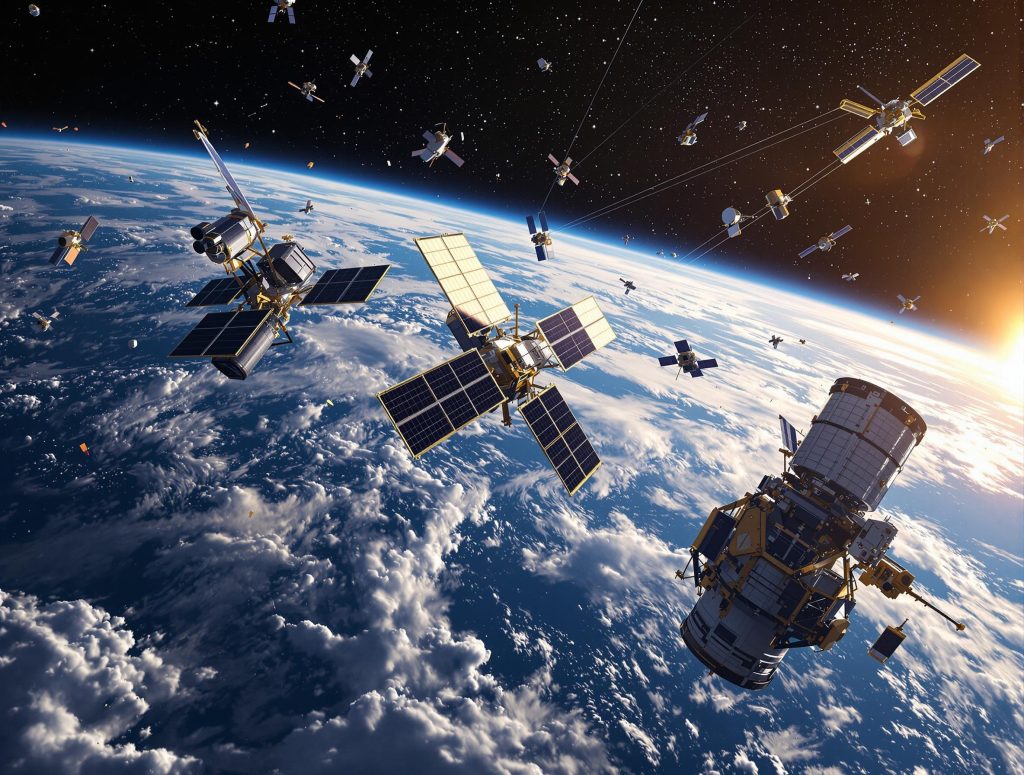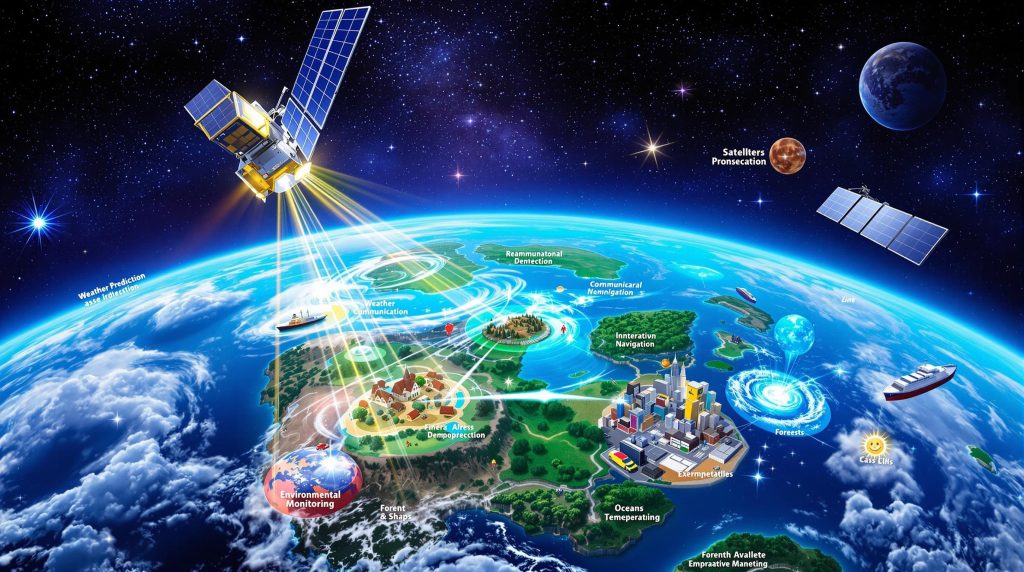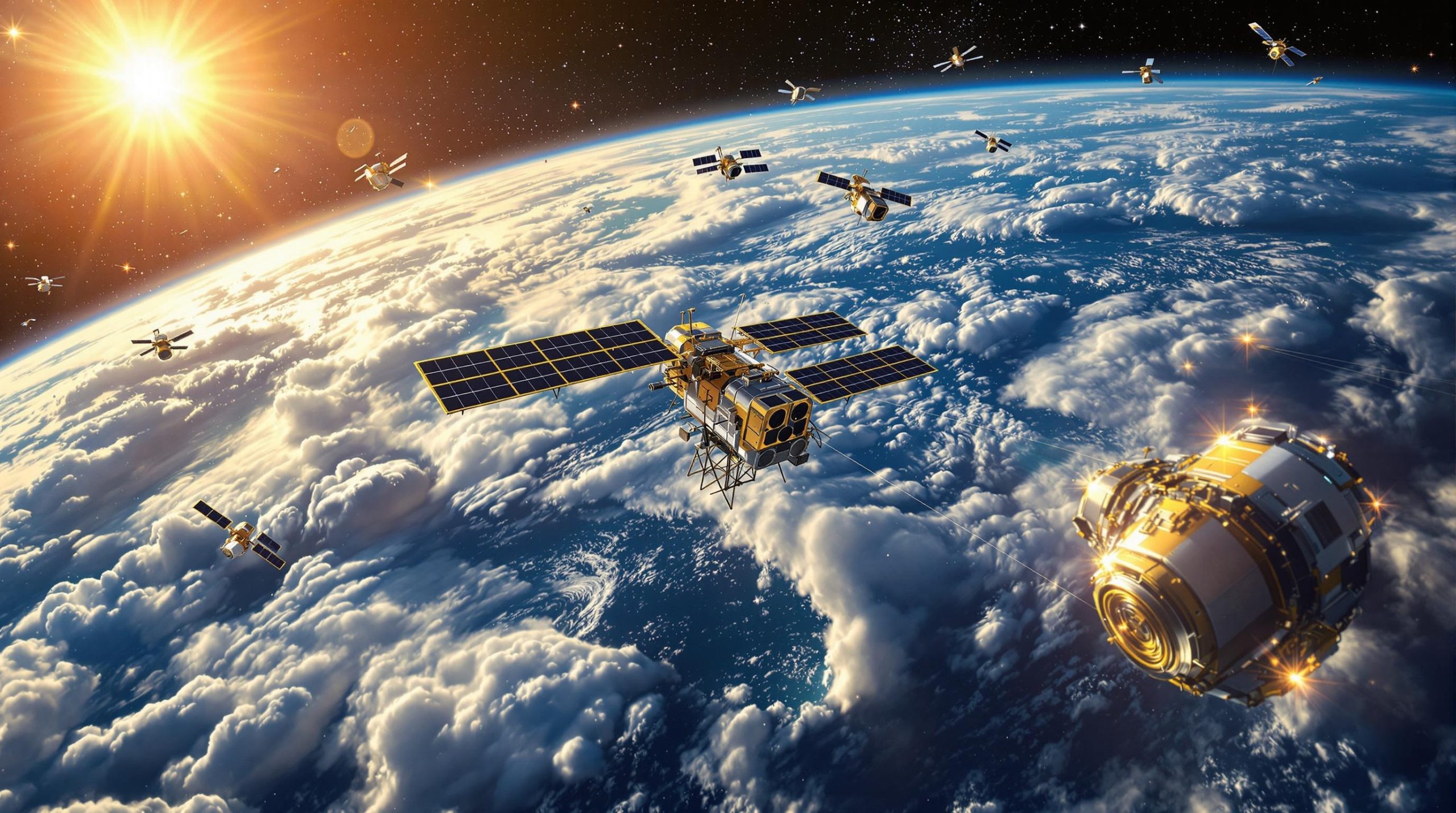Satellites orbit high above Earth, yet their influence reaches every corner of our daily lives. While they might seem like distant pieces of technology, satellites play a crucial role in communication, navigation, weather forecasting, and even environmental monitoring. In this article, we’ll explore how satellites impact our everyday routines and why they are indispensable to modern society.
What Are Satellites? How Satellites Help ?
Satellites are man-made objects launched into orbit around Earth. These devices are equipped with various technologies to perform specific tasks, such as capturing images, relaying signals, or observing weather patterns.
There are several types of satellites, including:
- Communication Satellites: For broadcasting signals and enabling global communication.
- Weather Satellites: For monitoring atmospheric conditions.
- Navigation Satellites: For providing GPS services.
- Earth Observation Satellites: For tracking environmental changes.

1. Communication and Connectivity
Satellites are the backbone of global communication systems. They facilitate:
- Television Broadcasting: Satellite TV ensures that even remote areas can access news, entertainment, and educational content.
- Internet Services: Satellites connect people in isolated regions where traditional infrastructure is unavailable.
- Global Phone Communication: Satellite phones provide connectivity in disaster-stricken or rural areas.
Satellites form the backbone of modern communication networks, ensuring global connectivity. They enable satellite TV broadcasting, allowing access to news, entertainment, and education, even in remote areas. Satellite internet connects regions lacking traditional infrastructure, bridging the digital divide.
Global phone services rely on satellites for uninterrupted communication, especially in disaster zones. Moreover, businesses and governments use satellites to maintain secure, real-time communications worldwide. Everyday activities like video calls and streaming content heavily depend on satellite technology, seamlessly integrating into our lives.
Everyday Impact:
- Streaming your favorite shows on platforms like Netflix often involves satellite technology.
- Video conferencing tools like Zoom rely on satellites to maintain international connectivity.
2. Navigation and Transportation
Global Positioning System (GPS) satellites revolutionized how we navigate the world. Whether driving in a city or hiking in the wilderness, GPS provides precise location data.
Satellites revolutionize how we navigate and transport goods, offering precise location data through GPS (Global Positioning System). Navigation apps like Google Maps and Waze rely on satellite signals to provide accurate directions and real-time traffic updates. In aviation, satellites guide airplanes along optimal flight paths, ensuring safety and efficiency.
Shipping and logistics companies track cargo, monitor fleets, and optimize delivery routes via satellite systems. Maritime navigation also benefits, enabling vessels to travel safely across oceans.
For personal use, outdoor enthusiasts rely on GPS to explore hiking trails or track fitness routes. Satellites ensure smooth, efficient, and reliable movement across land, sea, and air.

Key Uses:
- Travel Navigation: Apps like Google Maps depend on satellite data for real-time traffic updates and directions.
- Air Travel: Satellites guide planes along efficient flight paths.
- Shipping and Logistics: Satellites help track cargo, optimize delivery routes, and monitor fleets.
Everyday Impact:
- Finding the fastest route to work or tracking your food delivery wouldn’t be possible without satellites.
3. Weather Forecasting
Satellites monitor atmospheric conditions and predict weather patterns with remarkable accuracy.
Key Contributions:
- Storm Tracking: Satellites detect and track hurricanes, tornadoes, and other severe weather events.
- Climate Monitoring: They measure changes in Earth’s climate, such as global temperature rises and polar ice melting.
- Agriculture: Farmers rely on satellite data to plan irrigation, planting, and harvesting schedules.
Everyday Impact:
- Checking the weather app on your phone before heading out is made possible by satellites.
4. Environmental Monitoring
Satellites play a vital role in protecting our planet and understanding environmental changes.
Satellites play a critical role in tracking and addressing environmental changes. They monitor deforestation, illegal logging, and forest health, helping combat habitat loss. Satellites also track air and water pollution levels, offering data for improving public health and policy.
They observe climate changes, such as glacier melt and rising sea levels, providing valuable insights into global warming. Additionally, satellites support wildlife conservation by monitoring endangered species and their ecosystems, ensuring proactive preservation efforts.
Key Roles:
- Deforestation Tracking: Satellites monitor illegal logging activities and forest health.
- Wildlife Conservation: They help track endangered species and their habitats.
- Pollution Detection: Satellites measure air and water pollution levels across the globe.
Everyday Impact:
- Satellites contribute to clean air and water initiatives, ensuring a healthier environment for all.
5. Disaster Management
In times of natural disasters, satellites provide critical support for relief efforts.
Key Uses:
- Rapid Damage Assessment: Satellites capture images of affected areas to assess damage and prioritize aid.
- Emergency Communication: They maintain communication lines when terrestrial networks fail.
- Early Warning Systems: Satellites help detect tsunamis, earthquakes, and volcanic eruptions, giving communities time to prepare.
Everyday Impact:
- Satellites save countless lives by enabling efficient disaster response and preparedness.
6. Entertainment and Sports
Satellites bring the world closer through live broadcasting.
Key Contributions:
- Streaming live events, from global sporting tournaments to space launches.
- Providing on-demand entertainment via satellite TV.
Everyday Impact:
- Watching live coverage of the Olympics or a World Cup match is a satellite-powered experience.
7. Scientific Research and Exploration
Satellites are essential for advancing knowledge about our planet and beyond.
- Space Exploration: Satellites like the Hubble Space Telescope allow us to study distant galaxies.
- Earth Science: Satellites measure sea levels, monitor tectonic activity, and study Earth’s magnetic field.
Everyday Impact:
- Insights from satellites drive innovations in technology, medicine, and environmental science.
Conclusion
Satellites are silent workhorses that profoundly impact every aspect of modern life. From enabling global communication and navigation to monitoring weather and the environment, their contributions are both vast and vital. As technology continues to evolve, satellites will play an even greater role in shaping our future.
For more insights into the wonders of space and its impact on our daily lives, visit SpaceyV.



